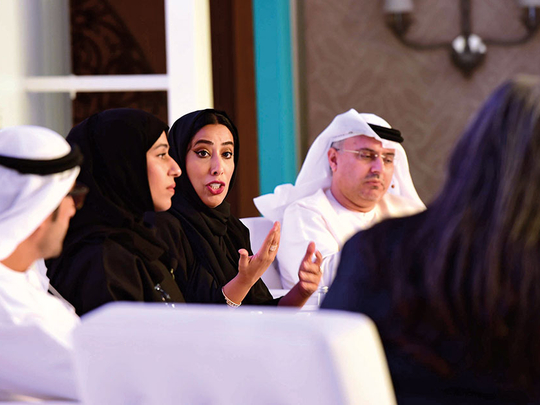
Dubai: A lack of awareness of UAE’s progressive legislations has been found as one of the contributing factors to many Emirati women not seeking employment, a new study has revealed.
The new study titled ‘Power of Choice’ by Dubai Women Establishment, which seeks to provide insights into the factors and challenges that hinder non-working Emirati women from joining the workforce, found that 80 per cent of women in the study do have an interest in working.
However, unawareness of certain legislations in place that offer paid maternity leaves, childcare centres and alternative working arrangements like working from home options have impacted their decision to enter or remain in the workforce.
The report, compiled by DWE through a field study and a survey across the UAE that sampled 2,000 working and non-working Emirati women, including males in their families, looked at the challenges women face and societal perspectives in the UAE.
“We carried out an intensive study that focused on the attitudes of women towards employment and the reasons behind them sitting at home and we found one of the reasons to be that they are not aware of the existing legislations and initiatives that exist in the market,” said Shamsa Saleh, CEO of Dubai Women Establishment.
But there are also some gaps in existing legislations that need to be addressed, she said, such as the difference between private sector and government sector legislations which “can create a problem.”
“UAE is the first country to have a legislation for having childcare centers in the workplace but not all companies are implementing it. Additionally, flexible working arrangements are also not effectively implemented.”
She added that DWE is working on proposing ideal solutions to the government in this regard.
Her comments came during the launch of the report on Monday, which included a panel discussion attended by ministers and female Emirati leaders. They highlighted that women make up 50 per cent of society and their participation is a national duty and is crucial to the economy.
Using the term “Deciding Women” to refer to women in the study as those who have either not been previously employed or wish to re-enter the workforce, the study also found that other contributing factors hindering women from entering the labour force is the challenge of striking a work life balance, lack of awareness of job opportunities in the private sector and shortage of jobs in northern emirates.
Some of the findings in the study showed some frequently cited reasons for leaving the workforce as: being married with children (42 per cent), unsuitable work hours (30 per cent), a job that is routine in nature (20 per cent) and a job that is too difficult to perform (15 per cent).
While being a wife and mother remains a priority, many want a successful career. Flexible working options, including part-time work, short work hours and small business opportunities were mentioned as a necessity for these women to appropriately balance their work and family lives.
During the panel discussion, Nasser Bin Thani Al Hameli, Minister of Human Resources and Emiratisation, said the country has set many enablers that encourage women to work, such as granting equal wages and salaries between both genders, 45 days maternity leave in the private sector, and 18 months breast feeding period.
“Apart from that, the ministry has also introduced initiatives and platforms to link national corporations with individuals who choose to freelance, providing incentives that encourage establishments within the UAE to seek the services of self-employed Emiratis.”
According to Al Hameli, 57 per cent of Emirati women take up positions in the private sector, 66 per cent in the government field and 33 per cent are in senior positions within the private sector.
With the study showing that 47 per cent of respondents as having a bachelor’s degree or higher and 77 per cent as playing the greatest role in their decision to seek employment, Hessa Bint Eisa Bu Humaid, Minister of Community Development, said the ministry is ready to train and rehabilitate them if they decide to enter the workforce.
“We are keen on encouraging women to join the workforce and to participate in the social and economic progression of the UAE. Employment is a value that is instilled within our culture and our history, and Emirati women who join the workforce are a source of pride for their families and nation.”
Mona Ganem Al Merri, Vice-President of the UAE Gender Balance Council, said the UAE has strong foundations put in place for empowering women and promoting equal opportunities for them and that there are many challenges that have been addressed through legislations that help increase the presence of women in the labour force.
Panellists said that current legislations provide solutions “but it’s just the beginning for larger initiatives.”








